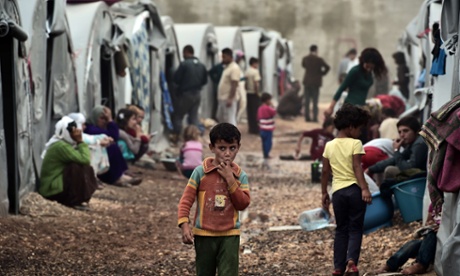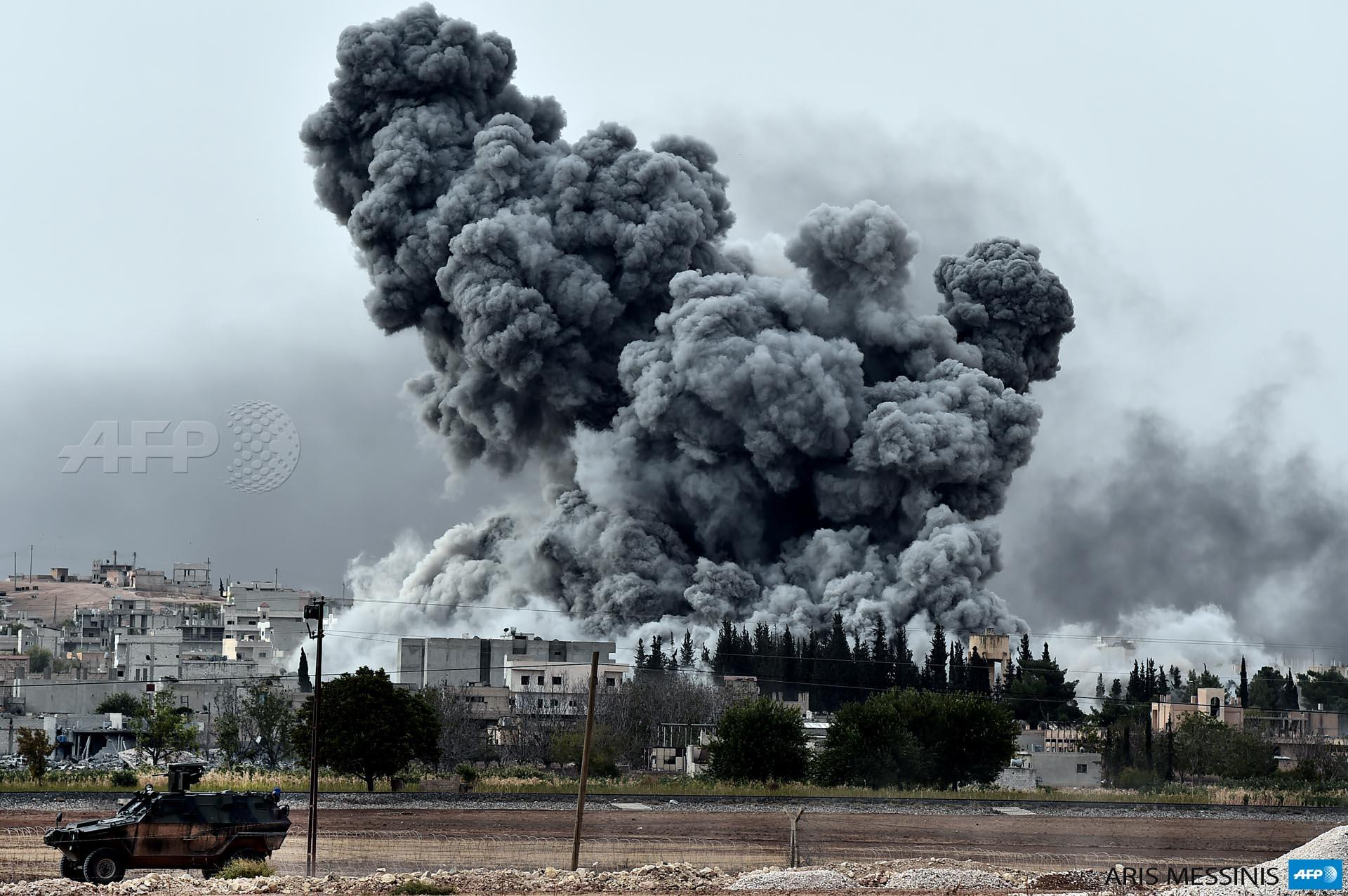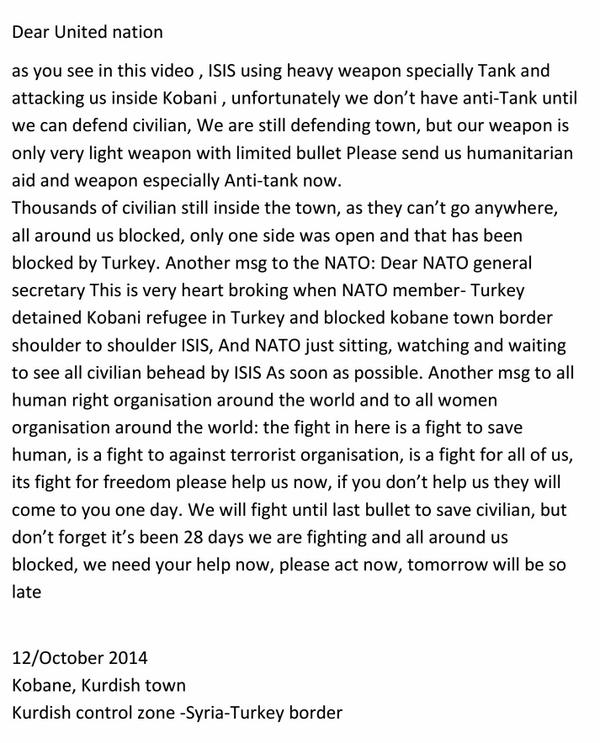Asya Abdullah: Corridor is essential

PYD Co-President Asya Abdullah, who is in Kobanê with the resistance, said: "In order for the encirclement of Kobanê to be broken a corridor is essential”. Abdullah said the gangs, who have suffered serious casualties, had brought in heavy weaponry and reinforcements from the areas under their control, and were launching concerted attacks. She added that they were press ganging Arab youths and forcing them to fight.
Arab families living in these areas have begun to leave in order to protect them from the ISIS gangs. PYD Co-President Asya Abdullah said: ''Our Arab people should take a stand against this gang that is the enemy of humanity.”
She reacted to statements by the Turkish authorities to the effect that “there are no civilians left in Kobanê,'' saying there were still thousands of civilians in the town. Abdullah reiterated her appeal for a corridor, emphasising that their resistance against mounting attacks by ISIS would continue without limit. PYD Co-President Asya Abdullah has been in Kobanê since the attacks began. She answered our questions regarding the Arab youth being inveigled into fighting by ISIS, the situation of civilians and the question of a corridor being opened to Kobanê.
The gangs are trying to plug the gaps by deceiving Arab youths
-It has been reported in recent days that the ISIS gangs have forced, or deceived by promising booty, Arab youths in the Manbij, Jarablus and Tel Abyad areas under their control to fight in Kobanê. Could you comment on this?
-The ISIS gangs have suffered serious blows from the YPG forces. They are constantly bringing in reinforcements from places such as Manbij, Jarablus, Rakka, Tel Abyad and Ayn Issa. As the gangs have suffered serious casualties, we have heard that they are telling young people in these areas that, ‘You can come and take whatever you like from Kobanê. Go and gather booty. Kobanê is now in our hands.’ They have fooled hundreds in this way. Arabs living here tell us that many of those deceived in this way have died here. The ISIS gangs are trying to plug the gaps by tricking the Arab people.”
Arabs leaving the region
-What is the reaction of the Arab people living here to this situation?
“We are aware that the Arab people are strongly opposed to this attitude of ISIS. We have heard that many people have begun to leave because of the ISIS practice of press ganging their children. ISIS is the enemy of the Arab people, too. We know from local sources that announcements are made from the mosques asking families to send their children to war and to join the jihad. In reaction to this families have not given their children to ISIS, and after repression have begun to leave.
ISIS is attacking the fraternity of peoples
-Do you have an appeal to make to the Arab people in this regard?
“Our political project is clear. The democratic autonomy project encompasses all the peoples of the region and envisages them co-existing fraternally. In our cantons Arabs, Syriacs, Christians and Circassians all live together. The YPG protects all the communities that live in the cantons. It is not just the defence force of the Kurds. We call on the Arab people to oppose the divisive policy of the ISIS gangs, which wants to deceive their children into getting involved in internecine strife. We can say that the Arab people do not approve of ISIS, but because they are under the control of ISIS they cannot do anything. This murderous gang slaughters anyone who opposes their laws. And they do not stop at physical massacre, they are also trying to destroy the existing fraternity of peoples here and the culture of co-existence. We therefore call on all communities to oppose ISIS and not allow them to destroy the fraternity of peoples.”
There are thousands of civilians in Kobanê
-The Turkish authorities say there are no civilians left in Kobanê. What do you say to this?
“We are in Kobanê. The canton administration is here. There are thousands of civilians in Kobanê' at this moment. They are alongside the YPG. There are thousands of people waiting on the border at Tel Sheir. These people also have thousands of animals. There are families whose children are fighting in the ranks of the YPG and do not want to abandon them. There are families who have lost children and there are those who are defending their homes. They do not want to leave Kobanê. So far 15 civilians have died in Kobanê.”
‘Civilians being slaughtered'
-It is reported a young woman was murdered?
“On 9 October we are aware that a civilian was shot by an ISIS sniper in the Tel Sheir area as she made her way to Kobanê. We have also heard that the gangs have murdered many civilian Kurds in the villages. A 20-year-old woman and an elderly woman were murdered, and we know of two elderly men being brutally murdered with stones.”
They have civilians and children
-Have the ISIS gangs captured any civilians?
“There are hundreds of civilians. Some of them were captured in the villages during this war. There are hundreds who were captured previously as they travelled from Kobanê to other regions. Some children have been released, but there are still around 30 children from Kobanê in the hands of the ISIS gangs.”
A corridor is urgently needed
-You have requested that a corridor be opened to Kobanê. What can you say about this?
ISIS is attacking with heavy weaponry. We have said many times that in order for there to be a stronger and more effective resistance and for civilians to be defended there is a need for a corridor. The coalition has made some interventions, which is positive, but a corridor is needed to counteract these heavy weapons and for support. The corridor is needed not just for arms, but also for humanitarian needs. Water supplies and electricity centres are now under the control of ISIS, so there is an urgent need for a corridor to be opened. In order for the encirclement of Kobanê to be broken a corridor is essential”.
-Have there been any developments regarding the opening of such a corridor?
“There are bodies that have put this on their agenda following our appeals and as a result of actions. We believe that there will be a positive outcome and that a corridor will be opened.”
-What can you say regarding the latest situation in the fighting?
They have brought in heavy weaponry and reinforcements from Rakka, Miabij and Jarablus and have stepped up their attacks since yesterday. They are trying to advance, but are suffering heavy casualties and cannot do so. They have heavy weaponry, but the YPG will continue its resistance to these attacks. The resistance to finish off ISIS will continue for months until it is accomplished.”
http://en.firatajans.com/news/news/asya ... tial-1.htm



























